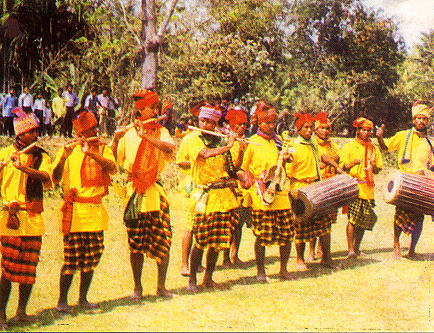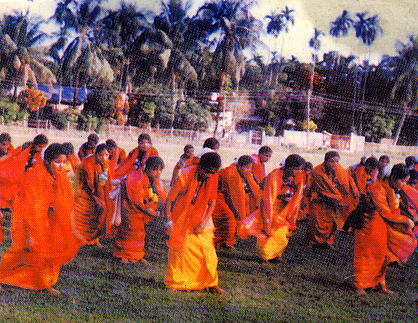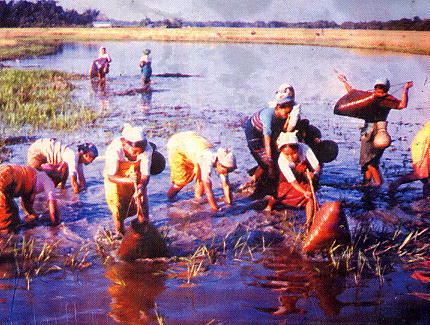BOOKS FOR YOU TO READ AND DOWNLOAD
- Lanuage In Science by
M. S. Thirumalai, Ph.D. - Vocabulary Education by
B. Mallikarjun, Ph.D. - A CONTRASTIVE ANALYSIS OF HINDI AND MALAYALAM by V. Geethakumary, Ph.D.
- LANGUAGE OF ADVERTISEMENTS IN TAMIL by Sandhya Nayak, Ph.D.
- An Introduction to TESOL: Methods of Teaching English to Speakers of Other Languages by M. S. Thirumalai, Ph.D.
- Transformation of Natural Language into Indexing Language: Kannada - A Case Study by B. A. Sharada, Ph.D.
- How to Learn Another Language? by M.S.Thirumalai, Ph.D.
- Verbal Communication with CP Children by Shyamala Chengappa, Ph.D. and M.S.Thirumalai, Ph.D.
- Bringing Order to Linguistic Diversity - Language Planning in the British Raj by
Ranjit Singh Rangila,
M. S. Thirumalai,
and B. Mallikarjun
REFERENCE MATERIAL
- Languages of India, Census of India 1991
- The Constitution of India: Provisions Relating to Languages
- The Official Languages Act, 1963 (As Amended 1967)
- Mother Tongues of India, According to 1961 Census of India
BACK ISSUES
- FROM MARCH 2001
- FROM JANUARY 2002
- INDEX OF ARTICLES FROM MARCH, 2001 - FEB. 2003
- INDEX OF AUTHORS AND THEIR ARTICLES FROM MARCH 2001 TO FEBRUARY 2003
- E-mail your articles and book-length reports to thirumalai@bethfel.org or send your floppy disk (preferably in Microsoft Word) by regular mail to:
M. S. Thirumalai
6820 Auto Club Road #320
Bloomington, MN 55438 USA. - Contributors from South Asia may send their articles to
B. Mallikarjun,
Central Institute of Indian Languages,
Manasagangotri,
Mysore 570006, India or e-mail to mallik_ciil@hotmail.com. - Your articles and booklength reports should be written following the MLA, LSA, or IJDL Stylesheet.
- The Editorial Board has the right to accept, reject, or suggest modifications to the articles submitted for publication, and to make suitable stylistic adjustments. High quality, academic integrity, ethics and morals are expected from the authors and discussants.
Copyright © 2001
M. S. Thirumalai
LANGUAGE NEWS THIS MONTH: BODO LAND
M. S. Thirumalai, Ph.D.
1. A NEW LIGHT ON THE NORTH-EASTERN HORIZON
The tripartite peace pact or the Memorandum of Settlement signed by the Central and Assam Governments and the Bodo Liberation Tigers is a very significant development for the linguistic and ethnic re-organization of Indian states. In addition, this understanding will put an end to the enormous suffering the Bodos and others who lived in Bodo and adjacent areas have been experiencing for the last 15 years.
2. A NEW BODO TERRITORIAL COUNCIL
According to this accord, Bodo Territorial Council will be established under the Sixth Schedule of the Constitution comprising four districts of Assam -- Kokrajhar, Chirang, Baska and Udalguri. The Bodo language will be included in the Eighth Schedule of the Constitution. (Newspaper reports are not very clear on this issue.)
The Bodos living in Karbi Anglong district may be declared to be a scheduled tribe (hills). A Central University with departments that offer professional courses such as engineering, medicine, agriculture, IT, etc. will be established.
The Council will consist of 46 members -- 30 tribal members, five non-tribal members, five general category members, and six nominated members who will be nominated by the Assam Government. A committee consisting a representative each from the Central and Assam governments, and Bodo Liberation Tigers would "decide by a consensus on the inclusion of villages and areas in the BTC where tribal population is not less than 50 per cent within a period of three months of signing the accord" (UNI news dated February 10, 2003).
The news report also indicated that,
The autonomous body will fulfill the economic, educational, and linguistic aspirations as well as socio-cultural and ethnic identity of the Bodos.The arrangement will result in the "creation of Bodoland as an autonomous self-governing unit within Assam." "The BTC, covering some 8,000 sq kilometers, would comprise some 3,082 villages and a population of some 23 lakhs" (Anjali Modi in The Hindu, February 10, 2003).
3. A BOLD STEP IN THE RIGHT DIRECTION
The move of the Central and Assam governments is a bold step in the right direction. The British accession of Indian princely states into a single political nation, British India, and their act of dividing these territories into various administrative units did not really consider linguistic identities as an important factor. The re-organization of various administrative provinces into linguistic states in 1956 also did not fully satisfy the aspirations of various linguistic groups. It looks like that such re-organizations must be viewed only as an ongoing process, a process that continues without affecting the integrity of India as a single political nation.
4. WHAT LIES AHEAD?
Unfortunately most linguistic demands have been agreed to or granted by the national leaders only after much agitation, often violent in nature. Yet there is an unmistakable trend noticed in India in the recent past. We have more states now than ever, we have more autonomous councils than in the past, and it is more likely that the creation of Bodo Council itself, in due course, may result in according that Council a full statehood in the future. It is interesting to note how independent India manages to meet the aspirations of linguistic and ethnic groups in a peaceful and amicable way.
Demands for autonomy or full statehood within the Indian Union from various linguistic and ethnic groups will increase. One could easily list areas that will demand such status in the near future. (I refrain from listing these possible demands here!) Geographical contiguity also is often considered important while conceding demands for statehood, etc. Moreover, even with such creation of special autonomous councils and granting full statehood, there will always be linguistic and ethnic problems. While granting autonomy and full statehood, it also becomes necessary to impress upon those who receive such status to carefully and sympathetically consider the demands of the remnant linguistic, ethnic, and religious minority populations in their midst, and enable them to participate fully and meaningfully in the public life as equal partners. Some states have shown their incapacity to appreciate this important necessity.
5. THE RESPONSIBILITY OF STATES AND LEADERSHIP
It is important for the states to review their education and employment policies, and ensure a fair deal to all the ethnic, religious, and linguistic groups within the states. Each state is as multilingual, multi-ethnic, or multi-religious as the Union is. Sometimes creating special councils may not really solve the problem, but such demands become strident when people's aspirations are not met by the current arrangements.
HOME PAGE | BACK ISSUES | Urdu In Uttar Pradesh and Uttaranchal | The Verb BE in Assamese | Hindustani as an Anxiety Between Hindi - Urdu Commitment : Linguistic Engineering of Language Loyalty | Language News This Month: Bodo Land | Language of Globalization: A Case Study of Tamil Advertisements | A Case for Roman Lipi for Indian Languages | Some New Books in Indian Linguistics | CONTACT EDITOR
M. S. Thirumalai, Ph.D.
Bethany College of Missions
6820 Auto Club Road, Suite C
Bloomington, MN 55438, U.S.A.
E-mail: thirumalai@languageinindia.com


